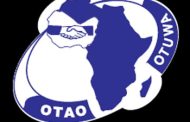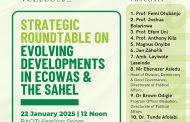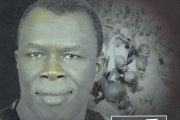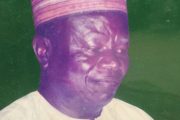
Some members of Borno Elders Forum some already late now

Sheikh-El-Zakzaky and Governor Nasir-El-Rufai of Kaduna State
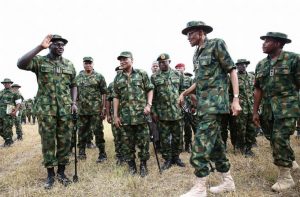
C-in-C-Muhammadu-Buhari
It is, to date, the most deliberate intervention from any quarters within both the Nigerian and the northern establishment. That is the public statement by the Borno Elders Forum asking President Muhammadu Buhari to amicably avert a situation where the Islamic Movement of Nigeria could metamorphose into another Boko Haram or something of that nature. At the heart of the caution is where the elders said as follows: For the record, Mr President, the Borno Elders Forum has no interest whatsoever in the existence or otherwise of Islamic Movement of Nigeria. However, we are deeply concerned that a dark history appears to be repeating itself and given our most horrifying experience in the North-East, we as elders owe you and our country the shared responsibility of pointing at potential danger and advising on ways to averting it”.
Although it is basically a caution against the possibility of history repeating itself too soon, it can be read as an argument for a normative approach to managing what has blossomed into the Shiite conflict with the Nigerian State. Embodied in that caution is a voice crying in the wilderness, insisting that the nation should spare no effort in taming the anger of the Shiite Movement to bring them to the logic that they lose nothing by living within the constitution, rules and laws of Nigeria the same way other Nigerians do. And to explore dialogue or any other peaceful means to make the point that it doesn’t pay to have divided loyalty to Nigeria such that someone in Zaria, Funtua, Katsina, Kano, Potiskum, Jos or Gusau, for instance, will pay homage to someone elsewhere at the expense of the Nigerian State.
At the moment, the Shiite are, rightly or wrongly, aggrieved and wounded since nearly a year ago in the aftermath of a clash with the military. What happens next depends substantially on President Buhari’s handlers. There are many who would say that a nation state which has wilfully and systematically delegitimized and disarmed itself over a long period of time has very little alternatives to having to negotiate with all those that challenge it, be it OPC, MEND, Boko Haram, IPOB or IMN. With an economic strategy that stripped the state of any sense of responsibility or obligations to the society for so long, everyone else, like the Naira, has found his or her value, leaving anarchy on the prowl. What the state has lost in the loyalty of the average citizen, the churches and mosques or pastors and imams have gained. So much have pastors and imams gained the loyalty of the citizens gathering around them in search of meaning that the result of any test of strength between the state and any pastor or imam is a foregone defeat of the state. That is what the Borno elders would seem to have recognised in their caution. The Borno elders can feel fulfilled that they have satisfied the requirement of speaking up as elders although there is something presumptuous in talking about Borno elders as if it is an entity in and of itself, with no relationship to time and space.
But locating Borno or any such category in space can be a tough task because, unlike the colonial state, the post colonial state has had no desire or capacity for ethnic profiling. Fearful of ethnicity, the post colonial state across Africa has tried to delegitimize ethnic groups in themselves. Marxist or radical discourse of ethnic identity has not helped matters. With neither the profiling nor the skills in managing ethnicity as an arena, the typical post colonial state in Africa has lived in utter fear of ethnic groups and ethnicity more than any other sub-groups on the continent. By the time more mature African intellectuals such as Lloyd Sachikonye of Zimbabwe and Mahmud Modibbo Tukur of Nigeria started arguing for engagement with the ethnic category, it was too late.
Plumbing into Borno or any other such ethnic group to establish the contextual link between the Borno elders and its intervention can thus be a difficult task whose outcome can only be patchy. Although the Borno Elders Forum is a multi-cultural, multi-religious body, it speaks to the Kanuri identity in Nigeria for whom Borno State in present day Nigeria is the homeland. The Kanuris do have noticeable spread in no less than six other African states, these being Garoua and Maroua in northern Cameroun, Diffa, Bosso and Damagaran in Niger Republic, parts of northern Chad, Libya, Sudan and the Central African Republic, (CAR), in none of these has it the concentration in one territorial stretch as in Borno, Yobe, Gombe, Bauchi, (around Misau, Katagum, etc), parts of Jigawa and Taraba states. Nowhere else in the world that such an unadulterated concentration of the Kanuri identity exists. And if the Nigerian State had overcome its crisis of self-understanding, the Kanuri identity must have been one of its strongest power resources in bidding for global power. At the moment, the conscious utilisation of individual identity groups as a power resource in achieving state purpose is absent from Nigerian foreign policy.
The above list is the extent of spread of the Kanuris as an identity. Historical accounts shows communication between Kanuri intellectuals and leaders of Egypt, Timbuktu in Mali and Libya during the Ottoman Empire which had borders with Borno. The question, however, is the cultural disposition of the Kanuris as a nationality. The problem of the Kanuris is its reported uncompromising disposition in terms of what can be called Kanuri traditions and culture even as liberal or welcoming of others as credited to them. It was said in the course of researching this story that the fact that Borno State does not have as frequent violent conflicts or tension over sharing of political power as some other states in the region is a positive testament to Kanuri’s welcoming attitude to strangers, inclination to inclusive practices and ability to assimilate differences. And when this claim was interrogated with respect to what might be said to be the totality of Kanuri attitude to the Nigerian State, the answer is that the measure for that can only be in the participation of people from the area in government and that if so measured, a case of solid contribution to nation building process of present Nigerian State can be established. But here, the Borno rather than Kanuri identity is emphasised.
The list begins with Sir Kashim Ibrahim, the first governor of the defunct northern region who had before then served as a minister in both Lagos and Kaduna. The late Waziri Ibrahim was mentioned as both a federal minister and later, the leader of a leading national political party in the First Republic. That is the defunct Great Nigerian People’s Party, (GNPP). Others are Kashim Imam, the leader of the Borno Youth Movement (MYM) whom the equally late Joseph Tarka had to take to contest election to the northern regional House of Assembly as opposition leader to the Northern People’s Congress, (NPC).
In the realm of the public service, the leading name here is Alhaji Shettima Ali Monguno, a graduate of the University of Edinburgh, the first OPEC President and minister in several ministries, especially Mines and Power, for nine years under General Yakubu Gowon. Ahmed Talib who was the first Permanent Secretary in the northern regional Ministry of Finance came from Borno. Others from the province include Liman Ciroma Adamu Fika, Ibrahim Damcida, Musa Daggash, Adamu Ciroma and they were ministers, permanent secretaries or heads of the Federal Civil Service. Further down is Abba Jiddum Gana, the first Agent-General of Northern Region in the United Kingdom, Alhaji A J K Imam, the Conservator-General of the then Northern Region and the first northerner to obtain a degree in forestry in the United Kingdom. In fact, the claim is that the people from the former Borno province occupied more than half of the senior positions in the then northern regional service and that it was based on merit.
Among the intellectuals mentioned were Professor Umaru Shehu, winner of National Merit award, Dr Musa Goni, Engineer Ismaila Borno and Shettima Gana, these being the first set of engineering graduates from the north.
In the security realm, Alhaji Kam Salem is mentioned to be Nigeria’s longest serving Inspector-General of Police. This was the case in relation to the military, it was also argued. Most notable here aside from such names as Zakariya Maimalari, Kur Mohammed, Abogo Largema is General Mohammed Shuwa, generally regarded as a hero of the Nigerian Civil War, fighting along with T. Y Danjuma, his Brigade Major. Dr Bukar Shuaib, the first graduate of Veterinary Medicine from the north who was to serve as National Security Adviser under the Shagari regime.
When it comes to journalism, the names most mentioned by almost all the respondents were Abba Zoru from the El-Kanemi royal family who turned a broadcaster, Bukar Petrol who served as northern editor of Daily Times and Kagu Damboa, the editor of the now dead Federal Government owned Morning Post. He was killed while reporting the Nigerian Civil War.
The point then is, when we say Borno elders are cautioning the Federal Government on an issue such as the Shiite conflict, this is the heritage of the elders in question. Connected to history, this identity has something to say about empire building, (the Bornu Empire and its managers – the Sayfawa Dynasty), Islam, (the first non-Arab Africans to become Muslims), external relations, (the Ottoman Empire nexus, something similar to the external relations of the Binis with the Portuguese). This is the logic of the notion of the ancient speaking to the modern state. Interpretation of their intervention can never be complete without this context, given that the intervention under reference is capable of a multiplicity of meanings, a process in which history or context can help.




